A huge banner drop across from the Buncombe County Courthouse signaled Asheville’s rejection of Duke Energy Progress’ plan to raise rates almost 15 percent.
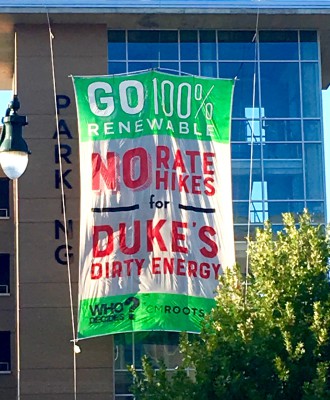
“Go 100% renewable. No rate hikes for Duke’s dirty energy,” read the banner activists dropped from the roof of the Buncombe County parking deck on College Street prior to a Sept. 27 N.C. Utilities Commission public hearing on the proposed rate increase. A lineup of 44 speakers echoed those sentiments over the course of a nearly four-hour hearing, one of five across the state before a Nov. 20 evidentiary hearing that will determine what energy customers will see on their bills come January.
In June, Duke Energy Progress filed a request with the Utilities Commission to raise rates an average of 14.9 percent. Residential customers would see an average increase of 16.7 percent, and commercial and industrial rates would go up an average of 13.5 percent. A typical 1,000-kilowatt monthly residential bill would increase from $104.68 to $122.48. As part of the new rates, the basic customer charge would jump from $11.13 to $19.50 for most residential customers.
If approved, the plan would affect DEP’s 1.3 million electric customers in the Asheville area and central and eastern North Carolina, and it would increase the company’s revenues by $477.5 million a year. Duke says it needs the added revenue to pay for new natural gas plants, coal ash basin closures and storm damage repair.
Cost of coal ash
Several speakers at the hearing took issue with Duke’s intention to make customers pay to clean up ash at its coal-fired power plants. Federal regulations require Duke to excavate and safely dispose of coal ash or to cap coal ash basins in place. According to the Environmental Protection Agency, coal ash contains contaminants such as mercury, cadmium and arsenic, which can pollute waterways, groundwater and the air.
Hartwell Carson, French Broad riverkeeper at MountainTrue, said environmental groups, businesses and members of the public have long pointed out the dangers of storing coal ash in unlined pits, and it shouldn’t be their responsibility to foot the bill for such practices. “While we think Duke should clean up all of their coal ash, we shouldn’t pay for their fight against cleaning it up and we shouldn’t give Duke Energy a blank check for work they haven’t even completed,” he said.
The Sierra Club of Western North Carolina also opposes putting the entire burden of cost related to the cleanup of coal ash on customers, said Judy Mattox, the group’s chair. “Coal ash has resulted in contamination of lakes, rivers, drinking water,” she said. “North Carolina has paid a heavy price and now Duke Energy wants to bill us for their negligence and mismanagement. We say no.”
More than one commenter implored the Utilities Commission to not only deny Duke’s requested rate increase, but also to investigate the company’s practices. Cathy Scott said the more she looks at Duke Energy’s plans for its business, the more she asks herself if the company knows what it’s doing. “The plan seems expensive, harmful, reckless with regard to their investors and risky in many ways to the rest of us,” she said. “We the people call for a Public Utilities-initiated investigation and audit into Duke Energy’s long-term planning, calculations, analyses and data — in other words, into their business plan. Investigate and audit, please.”
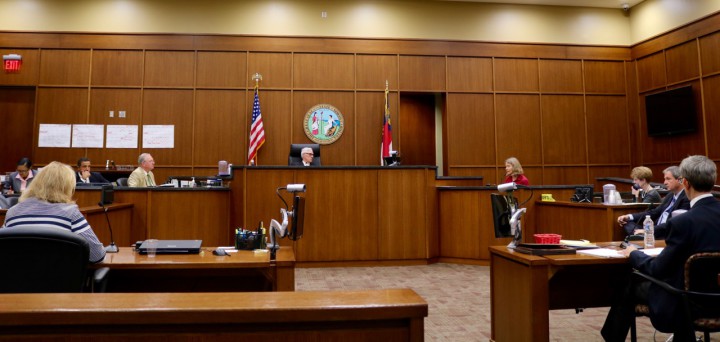
Too costly for some
While all Duke Energy Progress customers would see higher rates if the Utilities Commission approves the request, low-income customers could be the hardest hit. In particular, the proposed 75 percent increase in the monthly fixed charge could have a negative impact, said Bill Whalen, a staff attorney with Pisgah Legal Services in Asheville. “This fee is regressive, shifting a greater share of burden proportionately to individual customers and thus particularly to low-income customers, who are already struggling to meet their basic needs, while benefiting those larger customers who use the most energy,” he said.
Whalen asserted that imposing a hefty base charge that doesn’t vary according to a customer’s electricity usage will be a disincentive to conservation. “Mandatory fees undercut the incentive to conserve energy and the ability of customers to save money and control their own budget by reducing their monthly use,” he said.
Asheville resident Jim McGlinn opposes the rate hike because it presents “a huge difficulty for those who live in poverty and those who are on a fixed income like myself.” According to the U.S. Census Bureau, 17.3 percent of Asheville residents live below the poverty line. McGlinn compared the plight of that population with Duke Energy’s 2016 earnings of more than $2 billion and the $13.8 million total yearly compensation package for Lynn Good, the company’s CEO. “It is obvious that Duke does not need the money to survive, while the increased energy costs, in my opinion, might very well push homeowners over the edge into bankruptcy,” McGlinn said.
Residents on fixed incomes already take every step possible to bring their energy bills down, said Stephanie Biziewski, a retired Asheville resident who told of replacing an aging dehumidifier just to lower her bill by $17.85. She also pointed out that money she pays to Duke is money she won’t then be spending at local establishments. “Owners and employees of local businesses suffer without my patronage,” she said. “Duke’s proposed mandatory fixed-rate hike not only denies me my consumer rights, it also negatively impacts our local economy.”
Cost of ignoring the future

Why should customers pay for energy production technology that is becoming obsolete? That was a question posed by several members of the public who spoke at the hearing, wondering why they should invest in a company that they believe is not evolving with the times.
Steve Carter said companies that have trouble adapting to change tend to go out of business — like the makers of buggy whips. He sees rapid growth in technologies to produce energy other than the burning of fossil fuels, such as solar and hydrogen fuel cells. Carter also thinks society should move toward more dispersed energy production, which would help prevent catastrophic power outages when the electric grid goes down in an event like a major hurricane.
“We now have the opportunity to move the generation from central points to much more local, which of course Duke wouldn’t like because they can’t charge for it if it’s being generated in your backyard, and reduce the possibility of environmental damage and the complete loss of electric power in storms by generating the power locally, by distributing it locally and removing these methods of distribution and production that are becoming obsolete in our time,” Carter said.
An energy future dominated by gas would hold North Carolina ratepayers hostage, Xavier Boatright said. “As the cost of renewables fall, pipelines and other gas infrastructure will quickly become useless, yet we the ratepayers will still have to pay Duke back for the money they invested, plus a hefty rate of return,” he said.
Beyond opining that Duke’s future plans are not financially sound, commenters raised the concern that its business model doesn’t take into account the health of future generations.
James Smith, a student at UNC Asheville, said he felt compelled to speak on behalf of younger people who will inherit the legacy of fossil fuels. “It’s my generation that’s left with the results of these decisions, and that’s something that I want to make very clear to the commission,” he said. “This may sound like a moral tirade and climate rant, but this is something I fear for. I don’t want to bring children into this world if they can’t have their basic necessities met.” Smith said companies like Duke Energy are directly contributing to climate change, and supporting that means being complicit in “propagating the horrible storms that we are beginning to see.”
Calling on commissioners’ consciences
Some commenters made personal appeals to all six members and the chairman of the N.C. Utilities Commission, who were in attendance.
Kendall Hale said she’s been speaking out about Duke rate increases for over 10 years and she wishes she didn’t have to anymore. “I’m terrified about the direction that the state and this country and the world is going. The more we burn fossil fuels, the faster we are going toward dangerous and more terrible storms that we have seen hit our country and our coasts and partly here in the western part of the state,” she said. “Your responsibility as commissioners is to defend the public interest. Your job is to defend the health and safety of the public. That means no more burning of fossil fuels from Duke.”
If Duke is going to ask ratepayers to fork over more funds, that money needs to be going to the public good, which would mean a shift to 100 percent renewables, said Jamie Friedrich. “If we’re going to connect ourselves with the real world, where actions have consequences, where life is more important than money, where the Earth is more important than profits for a few hyper-wealthy people while the rest of us choke on air we can’t breathe — no. I say no. … Anyone that has a conscience — no,” she said.
Richard Fireman, founder of the Alliance for Energy Democracy, said society should pay attention to risk-based analysis of electricity generation in the context of climate change. “As the sea rises and the storms roll through our communities, it will be we the people who pay the price of property loss, public health costs and infrastructure loss while Duke gets away with profiteering from the economic and social catastrophe it caused by ignoring the risks associated with natural gas,” he said.
Sam Mac Arthur said she is 70, single and self-employed and would rather use the $20 monthly utility rate increase to take herself out to a fine meal. She reminded the commissioners that they too are human beings who have children and grandchildren and that they must not ignore their principles. “Open your heart to your conscience, pay attention to your dreams tonight because your ancestors are knocking on your doors loud and clear, and they will be heard,” she said. “Water is life, because it’s sacred to us. It’s our first medicine. We can’t live without clean water and we can’t live without air, and both of those things have been compromised by the choices that you have made. I hope you choose differently.”
Question about public access
At the commencement of the hearing at 7 p.m., 85 to 100 people were present in the courtroom. Audrey Yatras said during her testimony that some people who wanted to speak at the hearing were not allowed in. “The doors closed at the courthouse at 7 o’clock and most of the people that were outside — there was a large crowd of people outside who could not get in tonight, and I don’t know if anyone here was aware of that,” she said.
Asheville City Council member Julie Mayfield arrived after 7 p.m. and found the doors locked. She tells Xpress she texted Duke Energy representative Jason Walls, who helped her and another person waiting outside to get access to the chamber. “I do know [the doors] were still locked an hour later when a friend tried to get in and couldn’t. I don’t know why the doors were locked,” she says.
David Drooz, chief counsel for the public staff of the N.C. Utilities Commission, told Xpress a member of the public approached him after the hearing, saying the doors were closed on the grounds that the hearing room had reached capacity. “I just heard this secondhand, and cannot confirm whether the doors were closed before everyone had a chance to enter, or whether the room had reached capacity,” he says. “I do not know if the police consulted with the commission or just closed doors on their own initiative.”
Sam Watson, general counsel for the N.C. Utilities Commission, said the commission did not do anything to limit participation at the meeting. He directed inquiries to the officers providing security at the hearing. “We certainly didn’t ask them to keep anyone from coming in,” Watson says. “I spoke to the officer who seemed to be in charge, although I don’t recall his name, and he said that there was only one person who had tried to get in after 7 o’clock and they initially had turned them away and then let them in.”
Xpress contacted the Buncombe County Sheriff’s Office regarding the matter, and its public relations coordinator, Natalie Bailey responded, “I am in receipt of your request; it will be processed in accordance with North Carolina General Statute 132,” referring to the statute governing public records requests.
Danielle Peoples of Duke Energy told Xpress, “The hearing was scheduled and organized by the N.C. Utilities Commission, so that was not a decision made by Duke.”
Comments on the proposed Duke Energy Progress rate increase can be emailed to the N.C. Utilities Commission at statements@ncuc.net and to public staff at legal1@psncuc.nc.gov.
An evidentiary hearing is scheduled for Monday, Nov. 20, at 1 p.m. to hear expert witness testimony from Duke Energy Progress, the public staff, NCUC and any other parties to the proceeding. That hearing will be held in Commission Hearing Room 2115, Dobbs Building, 430 N. Salisbury St., Raleigh.
For more background on the rate increase, see “Duke sparks debate with request for 15% rate hike.”



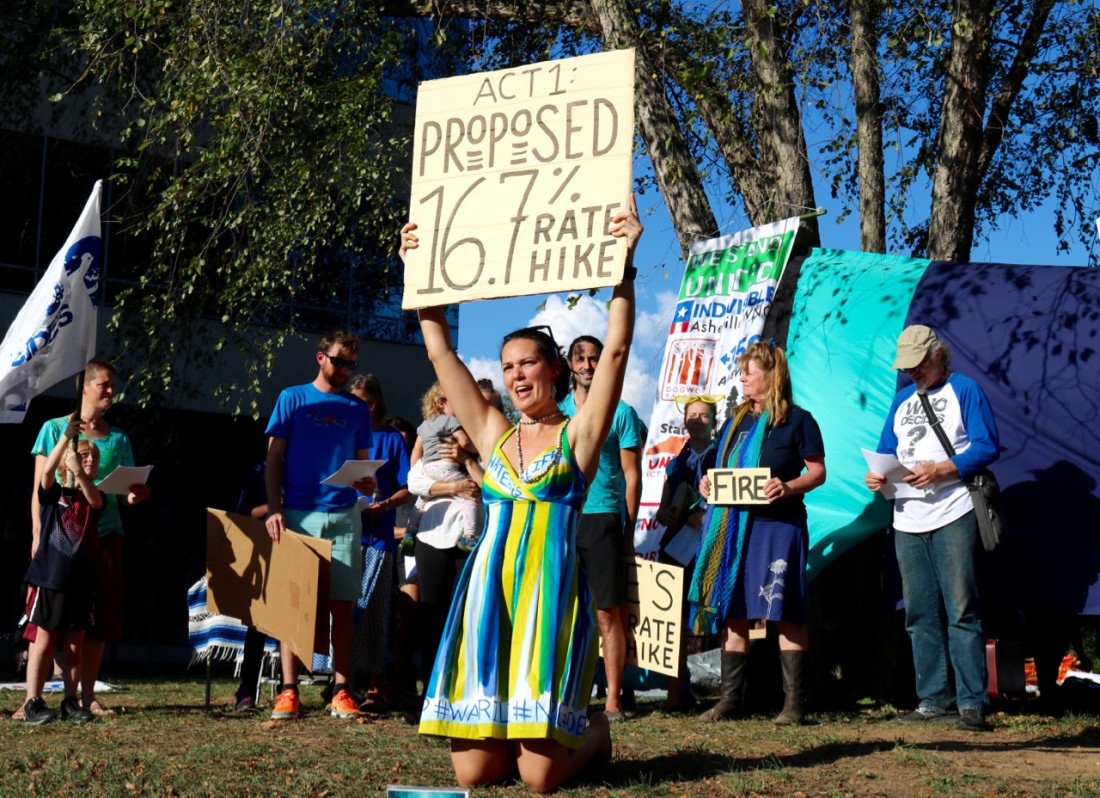





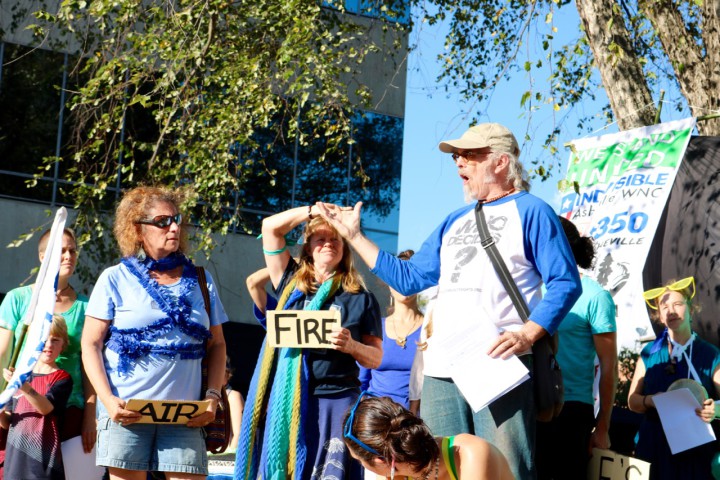






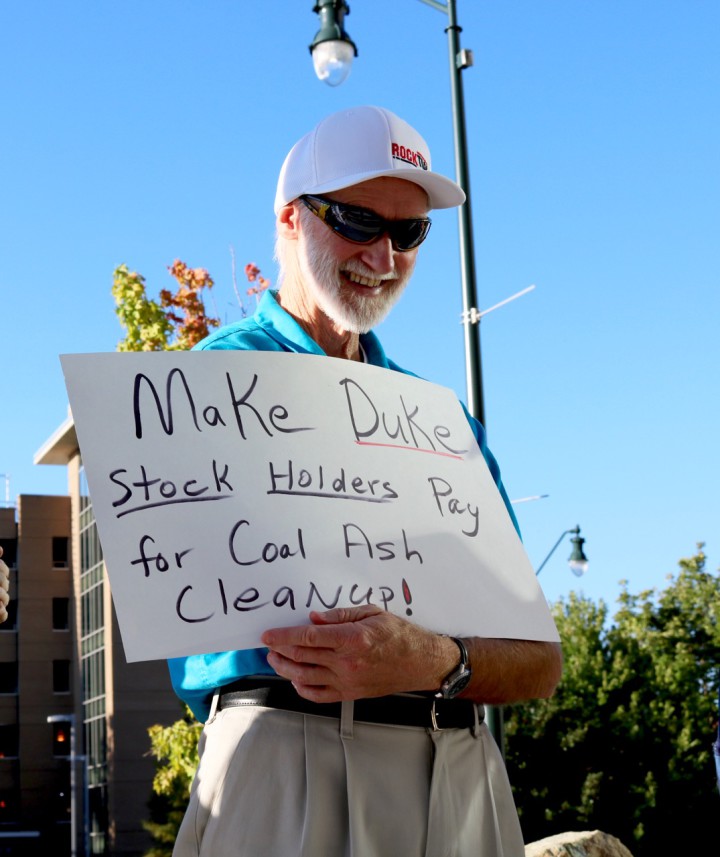
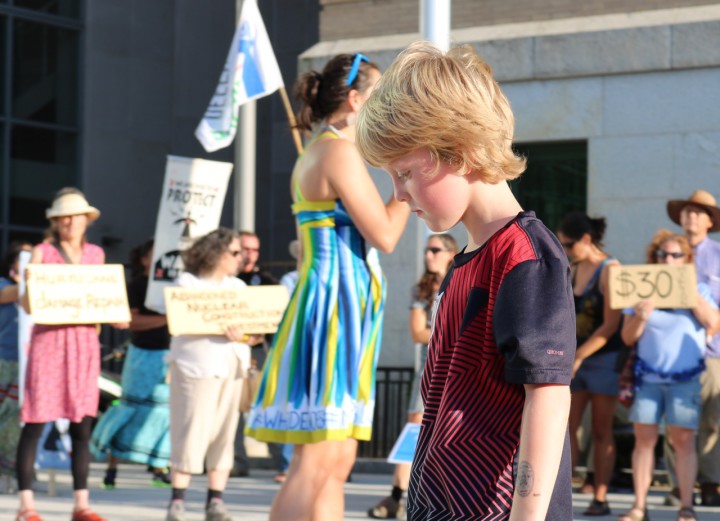
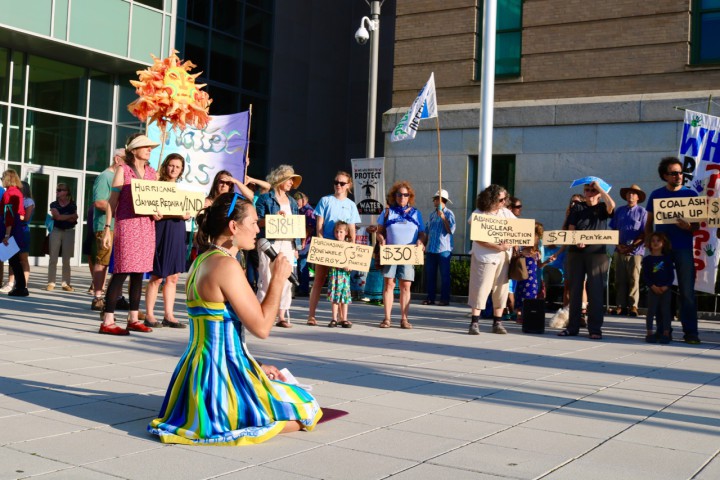
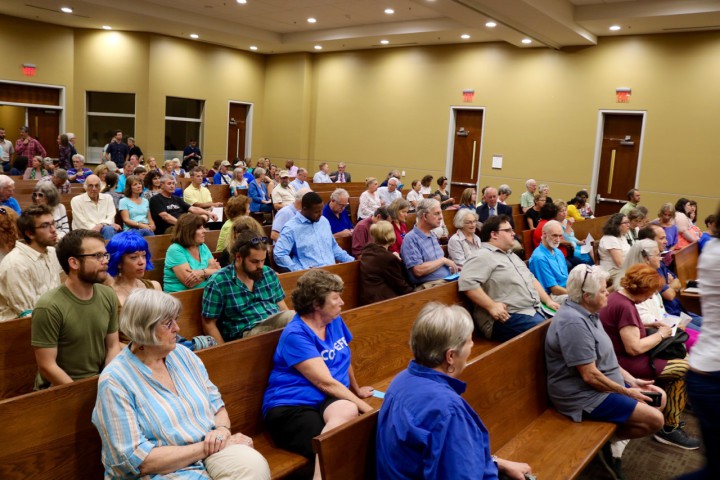
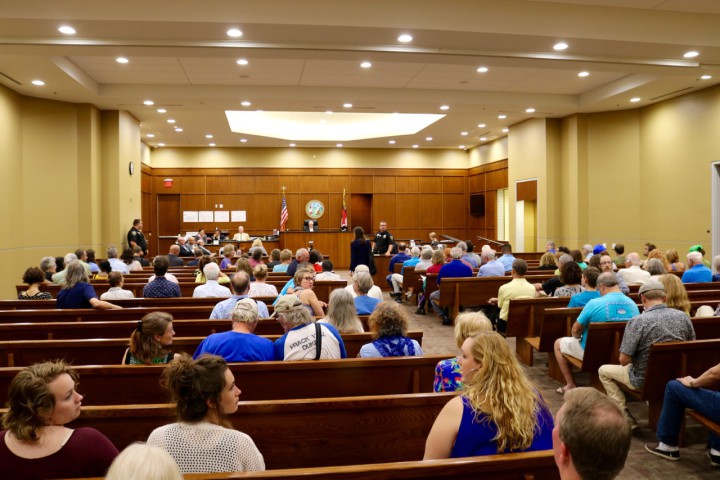
LOL ooh look, protest from those that live in lala land. If only they’d protest the tax hikes that are wasted away. I’d like the extra 2 grand in property taxes this year to pay for a meal too. Not the 20 bucks that granny is whining about.
Off topic much?
adorable jelly fish costumes … and the woman on stilts is fun too…beating their pots and pans …go girls!